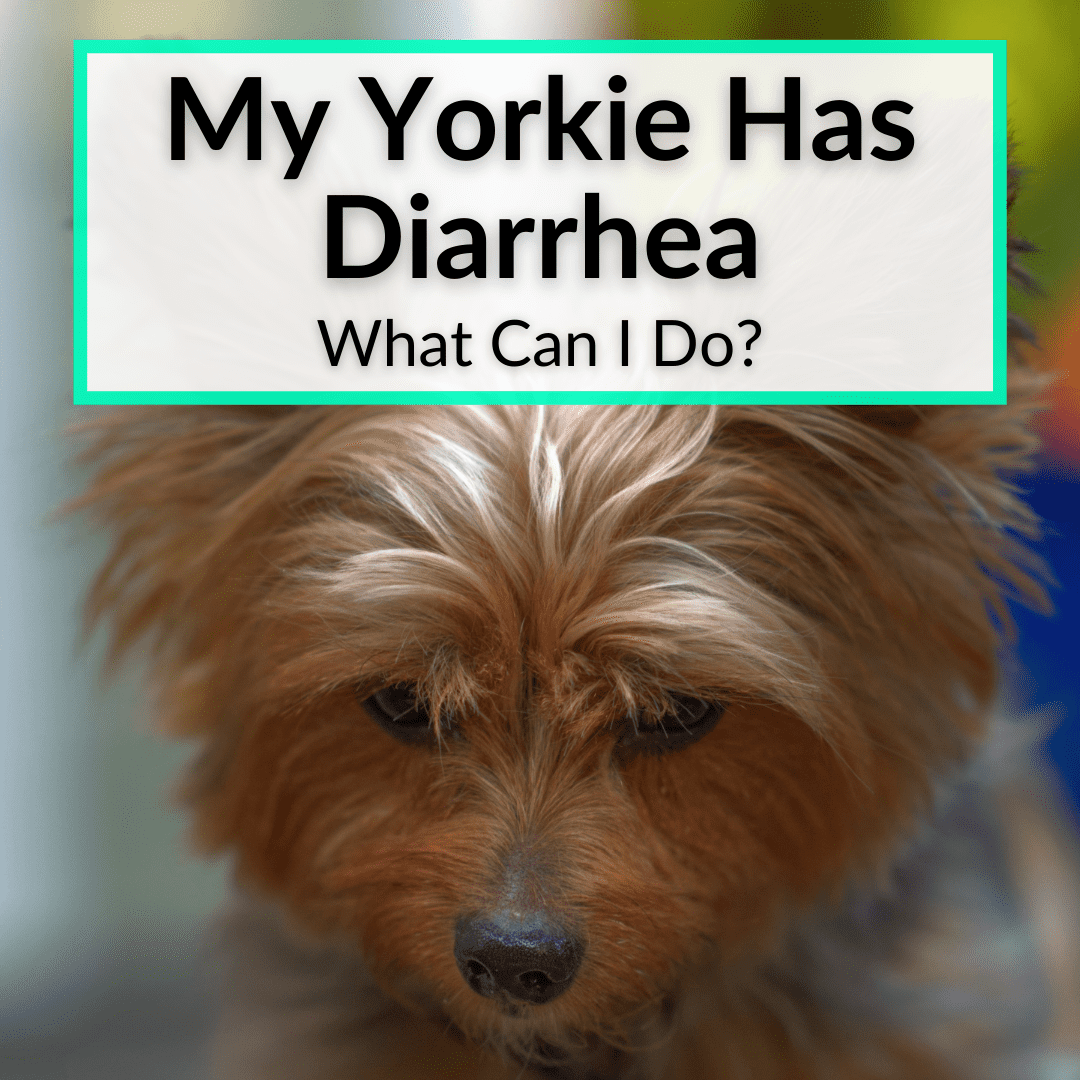
And one of the health issues your Yorkie will eventually face is diarrhea.
In a small dog like the Yorkshire terrier, a bout of diarrhea can be deadly serious. Your dog can quickly become dehydrated and even die.
That is why you need to know what to do when your Yorkie has diarrhea.
Quick and correct action can save your dog’s life.
Keep reading to learn what you need to do when your Yorkie has diarrhea. We’ll also cover the common causes and how to prevent it in the first place, since not having it at all is better than curing it.
Contents
My Yorkie Has Diarrhea: Treatment
To stop diarrhea, have your Yorkie fast for 6 to 24 hours. Then feed it with bland food after. Give its tummy time to heal by using natural remedies and incorporating probiotics and prebiotics into its diet.
As mentioned, diarrhea can quickly become dangerous in a small animal like the Yorkshire terrier. If your Yorkie is suffering from runny stool, follow these guidelines to remedy the issue. Let’s go through each step in detail.
Fast
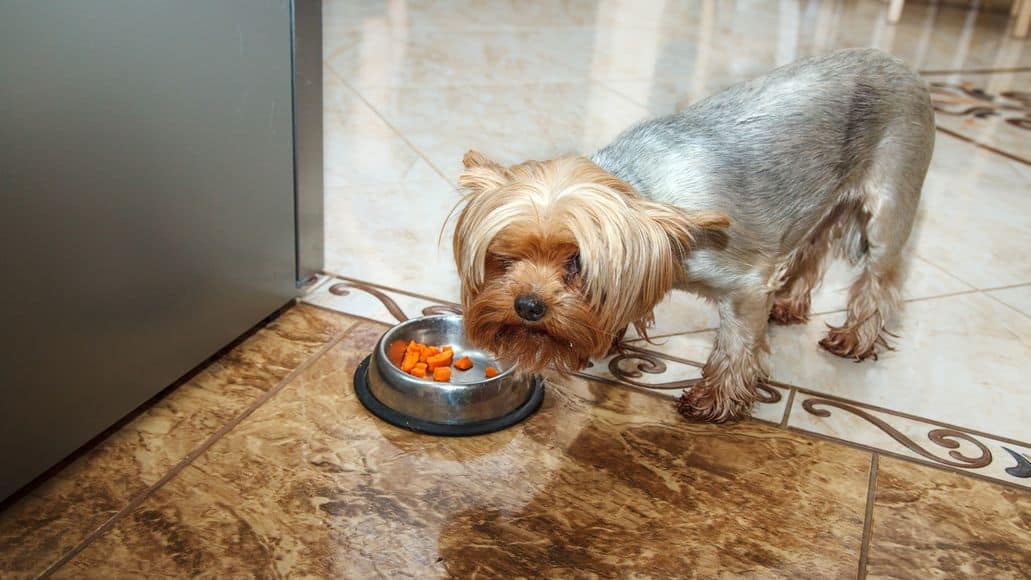
The first step to treat an acute non-severe case of diarrhea is to stop giving your dog any food for 12 to 24 hours. You should also limit your dog’s water intake.
Fasting allows the gut of your dog to rest and recover. If you feel that not feeding your dog for 12 to 24 hours is too long, you can start with just 6 to 12 hours of fasting.
If you Yorkie is still a puppy, disregard this step. We do not recommend fasting any dog that is younger than 6 months of age. Go straight to the next step.
Once the diarrhea shows signs of slowing down, start giving you dog water again. Small dogs like Yorkies should get a few teaspoons every few hours. Use spring or filtered water, if possible.
Note that limiting water is only a good idea if the diarrhea is caused by something your dog ate. If it is caused by another medical issue like dehydration and weight loss, you should do the opposite and give your dog lots of water to drink.
Finally, if your Yorkie suffers from low blood sugar (hypoglycemia), give it a small amount of honey to lick every hour. This is also a good idea if your pup is especially small. Do this more often, if your dog seems weak and is shaking.
Once the diarrhea has subsided and your dog has been consuming nothing but water for 6 hours, you can start giving your dog small amounts food. Stick to bland foods.
Bland Diet
When your Yorkie is ready to start eating food again, it is best to start with bland foods. A low salt chicken broth or bone broth is a great option.
You can also feed your dog mashed potatoes. But bone broth is generally the best choice. It is rich in essential nutrients and is easy on your dog’s stomach. Here is a recipe for a good soup to feed your dog after fasting.
- Put 3 to 4 chicken thighs in a pot with six cups of water.
- Boil them all together and simmer for 1½ to 2 hours.
- Remove the bones and skin, then set aside the meat.
- Use broth to boil 1 to 2 cups of chopped vegetables such as celery, carrots, yam, and cauliflower for 20 minutes.
- Let it cool before serving.
At first, offer the broth only, or add small amounts with meat and mashed vegetables. Small dogs should receive small portions of a few teaspoons. Give ½ to 1 cup for bigger dogs.
After 4 to 6 hours, observe your dog for vomiting or diarrhea following its first few meals.
Once your Yorkie is ready to move on to something more substantial, you can give it tiny pieces of boiled chicken breast and unsalted and unseasoned white rice. Mix them together before feeding.
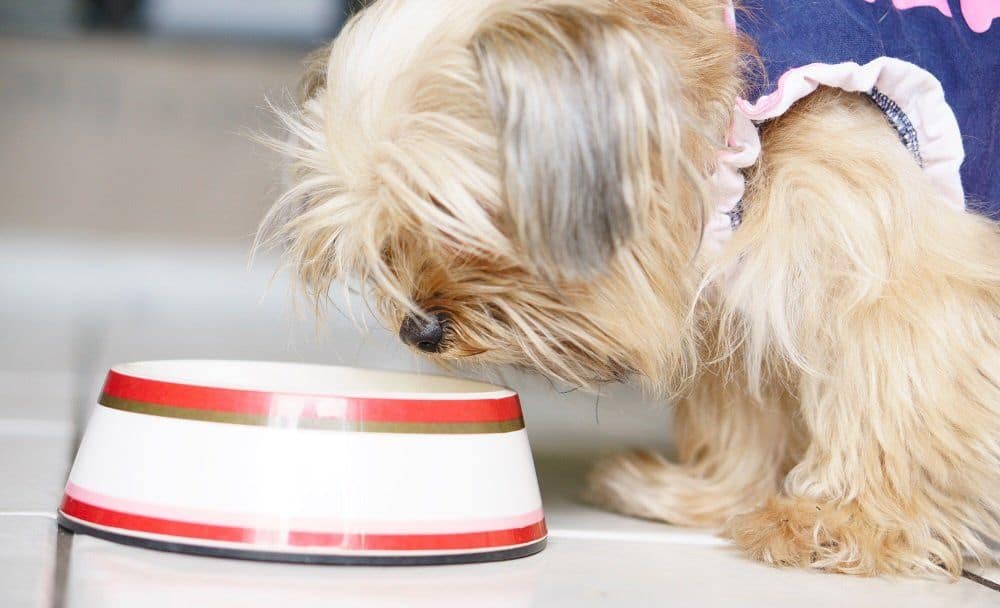
You could also consider adding a little pumpkin flavor to help with constipation or diarrhea, helping the stool normalize. Read “My Yorkie Is Constipated” for more on this. Maintain this kind of diet for about two weeks.
Probiotics And Prebiotics
Probiotics and prebiotics combine to keep the digestive system moving and to promote optimal gut health.
Probiotics help to restore and build the gut lining. You can feed your dog some yogurt, but a probiotic supplement would be better.
Your vet can recommend one and this is always the best option. But this supplement available on amazon is good:
Prebiotics turn into short-chain fatty acids (SCFA) once in the colon. They provide energy to colon cells, prevent the growth of harmful bacteria and preserve electrolyte balance.
SCFAs also keep the intestines of your dog moving. Prebiotics support and promote optimal gut health in combination with probiotics, making them more effective in stopping and preventing diarrhea, especially in Yorkshire terriers with sensitive stomachs.
Natural Remedies
The first three steps help to stop your Yorkie’s diarrhea. Once the diarrhea stops, the next step is to let your dog’s body recover. In the section just below, we have a list of natural home remedies for yorkie diarrhea. Choose the one that is best for your pet.
Veterinarian Help

If your Yorkie is suffering from moderate (or worse) diarrhea, it is highly advisable to seek a veterinarian’s help. Signs of moderate diarrhea are bloody diarrhea, vomiting, extreme weakness, and fever.
What do you do if you can’t afford a vet? You follow that link. It details 9 options you have if veterinary care just isn’t in your budget. Even if you don’t have to provide your dog vet care legally, it is still the right thing to do.
The veterinarian will run some tests to identify the cause, so that they can give your dog the proper treatment. Here are some more signs to look for that indicate you should contact your vet.
- Severe diarrhea
- Eating less than usual
- Drinking less than usual
- Vomiting as well as having diarrhea
- Constant diarrhea
- Blood in their diarrhea and/or mucus in their diarrhea
- Diarrhea as a young puppy or an elderly dog
- Sleeping more than usual
- They’re taking other medications, especially anti-inflammatory drugs (NSAIDs)
- Painful stomach
- Diarrhea that’s been coming and going for a while
- Diarrhea and other health issues
Home Remedies For Yorkie Diarrhea
As mentioned, the first step is to fast your dog and then start by giving it water and, eventually, easy-to-digest foods. After that you want to feed your dog probiotics and prebiotics. Finally, top it off with the following natural remedies.
Slippery Elm
Slippery elm is among the top natural remedies that can help your pet’s body heal after having diarrhea. It is a gentle herb that relieves the mucous membranes, to soothe the digestive system.
You can purchase slippery elm in both powder and capsule form at most health stores. Follow the recommended dosing below:
Slippery Elm Capsule
- Small dogs: mix ¼ of the slippery elm capsule into your dog’s food twice daily.
- Medium dogs: mix ½ of the slippery elm capsule into your dog’s food twice a day.
- Large dogs: empty 1 capsule of slippery elm into your dog’s food once or twice a day.
Slippery Elm Powder
- Mix ¼ tablespoon of slippery elm powder into your dog’s food for every 10 pounds of its body weight.
This is a good slippery elm supplement made specifically for dogs.
L-Glutamine
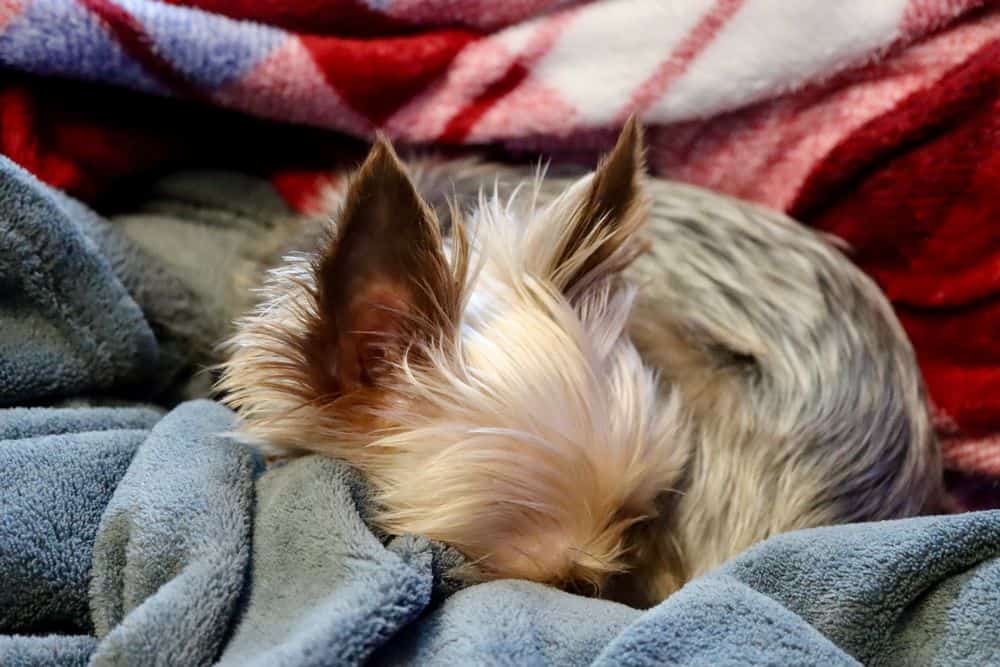
The intestinal cells of your dog also need healing after suffering from diarrhea. L-Glutamine, an amino acid, can do the job. Add 500 mg of L-Glutamine for every 25 pounds of your dog’s body weight daily.
This is a good L-Glutamine supplement on Amazon:
Marshmallow Root
Another useful natural remedy is marshmallow root. It has the ability to soothe the gastrointestinal tract after suffering from diarrhea. Health stores sell them in a ready-made or tincture form.
You can add 0.5 to 1.5 ml of marshmallow root for every 20 pounds of your dog’s body weight 2 to 3 times daily.
Digestive Enzymes
Digestive Enzymes are also great for dogs that should not yet eat fresh and raw foods. The live enzymes they provide are derived from a natural raw food source.
Expect your dog to have improved digestion after consuming digestive enzymes. But you should know that some dogs don’t react as well to this natural remedy, and end up having gas and abdominal bloating.
If you want to try this remedy, start with a reduced dose, then increase gradually.
Many probiotic and digestive support supplements for dogs include digestive enzymes. So, read the labels carefully to avoid giving your dog too much.
Bach Flower Remedies
To stop your dog from having diarrhea, the rule of thumb is to target its possible causes. Stress is among the top triggers of diarrhea in dogs. If you think it is the culprit behind your dog’s suffering, try using Bach Flower Remedies.
Bach Flower Remedies are made with flower essences that are gentle and safe, even for dogs. Like humans, dogs and other animals can also take flower essences to relieve emotional stress.
Try adding a few drops of this natural remedy to your dog’s water bowl, or directly into its mouth, several times a day. If your dog doesn’t need them, they simply won’t have any effect.
Prevention Of Diarrhea In Dogs
Keeping your dog happy and healthy is the best way to prevent diarrhea. And the most important step to achieving that is a healthy and balanced diet and daily exercise. You should also stay up to date on your dog’s vaccinations.
Try to keep your dog’s environment as stress-free as possible. When your dog is in a kennel with other dogs, make sure that it’s washed and disinfected.
Dogs are sensitive to change, so it’s helpful to keep a daily schedule with sleep, food, exercise, and walks. Another thing that can improve is to have a weekly obedience practice.
When out on walks, keep an eye on your dog and make sure it does not ingest random things like trash, puddles, plants or other things that it should not be eating.
Feces can also cause diarrhea. Your dog will want to smell the feces of other dogs, but this is obviously not the most hygienic thing to do.
Basically, exercise common sense in treating your dog and you are already doing a lot to prevent diarrhea. It can also help to know the most common causes.
What Causes A Yorkie To Have Diarrhea?
Diarrhea can come on with no warning, so you need to be ready for your Yorkie babies to experience this at any given time. It helps to know what causes diarrhea, so let’s take a quick look at the most common causes.
Stress
Stress can cause diarrhea and a lot of things can cause your dog stress. Moving to a new home, meeting new people or animals, a lot of noise in the environment are all things than can be overwhelming and cause stress.
Training your dog for socialization can help reduce the effects of some of these changes, so that they do not cause nearly as much stress.
Change In Diet
Whenever you decide to give your Yorkie a new food, do so slowly, because the change may cause stress. This can easily cause diarrhea and vomiting.
Viruses And Infections
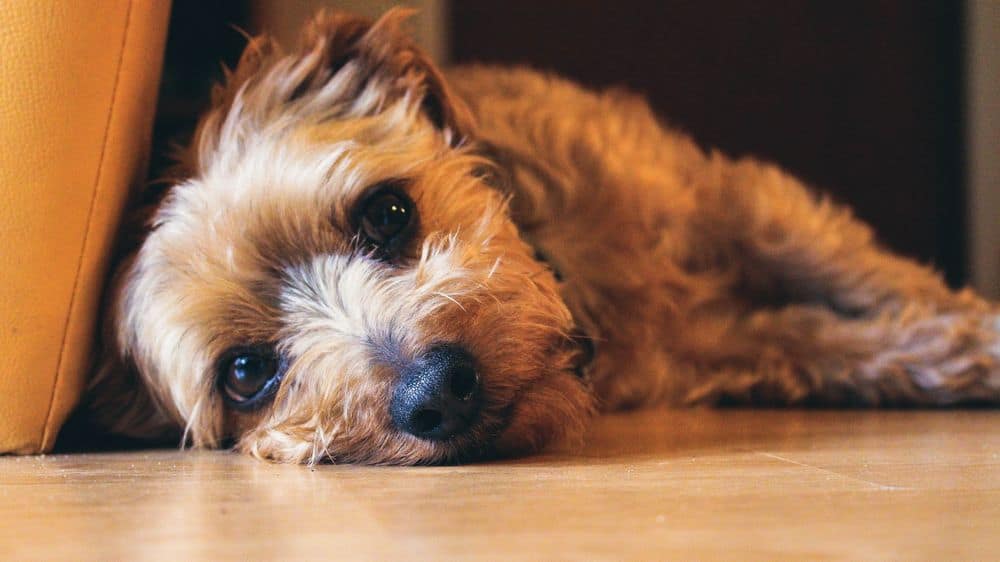
All dogs are vulnerable to bacterial or viral infections and many of these cause diarrhea. Puppies’ immune systems are not fully developed, so they are even more susceptible to pathogens.
Plus, they may not have received all of their vaccinations yet. Viral infections such as parvovirus and distemper can infect an unvaccinated puppy and cause diarrhea. They are all dangerous, but parvo is the one you need to look out for the most.
Parvovirus
Parvo is incredibly infectious and is a huge danger to unvaccinated puppies. Parvovirus affects rapidly dividing cells, such as those that line the intestines and those that combat infection.
Not only does parvo cause severe bloody diarrhea, but it also leaves puppies vulnerable to bacterial infection. Dog diarrhea caused by parvo is often profound and painful, requiring intensive hospitalization.
Untreated, the survival rate of parvo is less than 25%. Intensive veterinary treatment, with multiple days of intensive care, including antiviral medications, antibiotics, and fluids, will lead to 75% recovery.
But remember, the healing process is likely to cost you a fortune.
A series of cheap and effective vaccines can cure parvo. Puppies should also drink milk from their mother within the first 12 to 24 hours of birth to receive a dose of natural antibodies.
This should protect the puppy against parvo for the first 2- to 3 months of life. Then, at 6 to 8 weeks, the puppies should receive parvo vaccines.
Remember to boost the vaccine every 3 weeks until the dog is at least 12 to 16 weeks old. Read our article detailing a Yorkie vaccination schedule here.
Parasites

Parasites are everywhere. Puppies can even inherit some intestinal parasites, such as roundworms and giardia, from their mothers.
It is also possible to pick them up from dirt or infected water. Your vet can treat most common intestinal parasites. This is important, because some of them can be quite harmful and can even cause your Yorkie to die suddenly.
It is also a good idea to regularly deworm your dog, especially when it is young, or when you notice symptoms of a worm infestation. Learn how to deworm a puppy, so you can do it yourself at home and save yourself several trips to the vet.
Diet
The digestive systems of puppies are still developing, and certain puppies may have weak stomachs. This indicates that they may have had a rough time coping with specific products or styles of food. Most would also respond poorly to a sudden shift in diet.
There are a few food disorders that can lead to diarrhea. Check with your doctor to ensure the food you have picked is a proper fit for your puppy’s needs.
There are several different forms of food available, and one is sure to be right for your dog. Get only the best dog food for yorkie poo to be regular.
Besides having delicate digestive tracts, puppies are also curious, and almost all they find fascinating can be eaten or swallowed. This can involve a string, waste, or nearly everything they see on the field.
In some cases, this can be dangerous. Some items can induce intestinal blockages, while others may be poisonous.
Studying Your Yorkie’s Poop
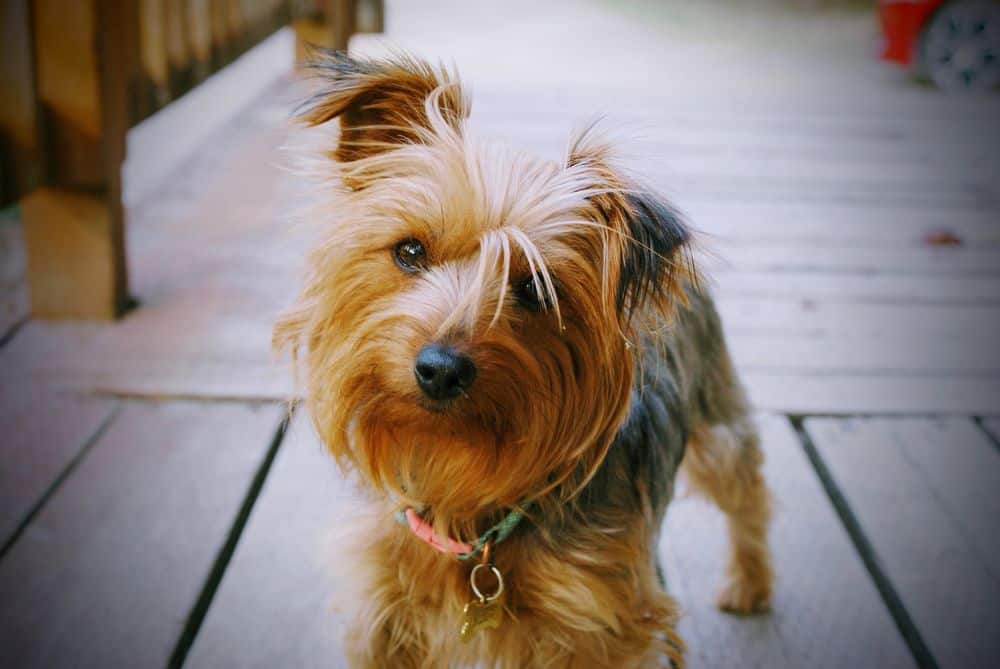
Disgusting as it might be, your Yorkie’s poop can actually tell you a lot about its current health condition. Let’s take a look at some different types of stool your dog might have.
Normal Stool Textures
You can determine a normal stool if it has a consistency that is formed but quite soft. Here are other traits that you should look at:
- Stool that has little to no segmentation
- Log shaped stool with a wet surface
- The stool holds firm when picked up, but leaves a residue
When your dog is eating raw foods along with plenty of bone, it is normal to have a chalky or crumbly stool. Many dog owners confuse it with constipation.
The characteristics you can also observe with that type of stool are:
- Segmented sections
- Firm, but not hard
- Hardly leaves any residue when picked up
Usually, dogs defecate once or twice daily, and it happens nearly the same time of the day.
Abnormal Stool
Now let’s look at some possible characteristics of your dog’s poop that can be warning signs of diarrhea.
Loose Stool
Thin or watery stool is not normal for dogs. These are the characteristics of loose stool.
- No distinct shape
- Has texture
- Leaves residue when picked up
- Watery
- Can’t be easily picked up
- No texture; it looks like a puddle
Soft Stool
If your dog’s stool has the following consistencies, it can be categorized as soft stool.
- Log shaped but soggy
- Instead of a log, it looks like a pile
- Loses form when picked up and leaves a residue
- Very wet, with a distinct shape
When your dog is experiencing abnormal stools, it might have several bowel movements a day. What is worse is that it might be on your rug, or worse, on your bed.
Dogs that often experience abnormal stools might have chronic diarrhea. To solve the issue, you need to determine the cause.
You can also determine if your dog is having abnormal stools if the stool:
- Looks like pellets
- Takes a lot of effort to come out
- Is very hard and dry
- Leaves no residue when picked up
Aside from these characteristics, an abnormal stool can also include mucus or blood. Its consistency does not matter.
The Color Of Poop
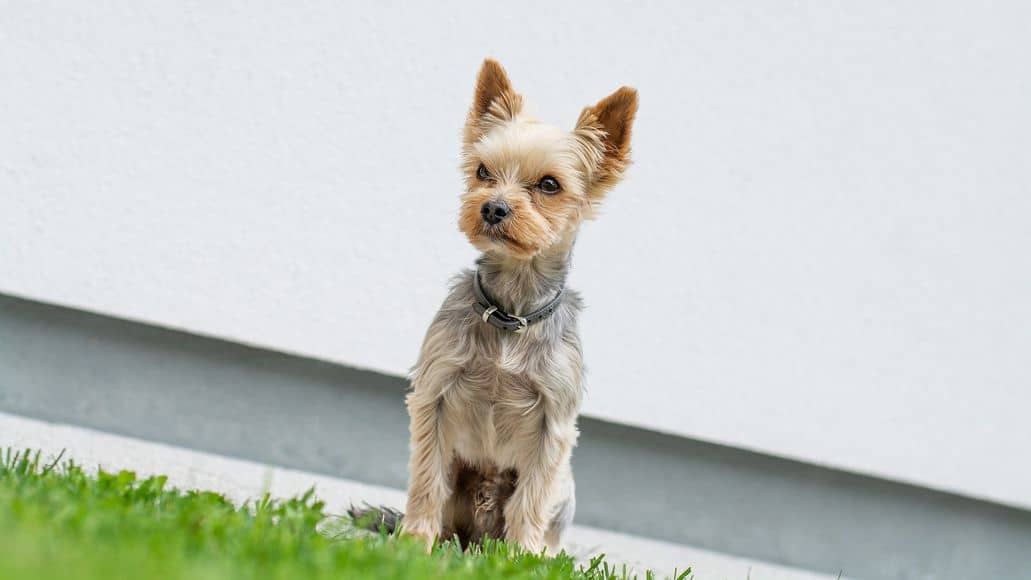
Most people agree that prevention is better than cure. It is best to spot the signs of diarrhea before it becomes worse. Here are some of the possible colors of dog stools and what they indicate about your dog’s health.
Yellow Poop
Yellow dog stool is a sign of trouble. Listed here are the common causes why your dog’s poop might be yellow.
- The parasite coccidia
- Changes in the liver
- Pathogenic bacteria overgrowth
- Stool that passes through the GI tract too quickly to pick up bile (a substance that makes poop brown)
Green Poop
If your dog passes green poop, it is due to gastrointestinal hypermotility. This condition is a warning sign that your dog has a hard time digesting bile, or that the poop is passing through the GI tract very fast.
If your dog produces green poop several days in a row, bring it to a vet immediately. Another factor that makes your dog’s poop green is when your Yorkie eats a lot of grass, or worse, goose poop.
Orange Poop
Orange poop can be a sign of an acute health issue. It can usually be solved with a bland diet and fasting.
Blue Poop
Blue poop is the worst stool color that you should watch out for. If your dog suddenly passes a blue stool, take it to a vet right away. Make sure to bring a sample of its poop, too.
White “Rice” Poop
Dogs passing rice-like pieces of poop is usually a sign of a tapeworm infestation. You can also observe that the stool is either loose or solid.
Black Poop
Black stool often indicates blood in the stool. For dogs, this can be a serious problem.
Grey Poop
If your dog passes grey, greasy stools, it might be a sign of a biliary or pancreas issue.
My Yorkie Has Diarrhea: Conclusion
The best course of action with diarrhea is to not get it in the first place. Treat your dog well and you can minimize the risks it gets sick. Knowing the most common Yorkshire terrier health issues that cause diarrhea will help with that.
Even if you do everything right, your Yorkie can still have diarrhea. When it happens, you want to be prepared and know what to do.
That way, you can get your little furry friend back to feeling 100% as quickly and painlessly as possible. And if it seems to be suffering from pain, learn what you can give your Yorkie for pain.
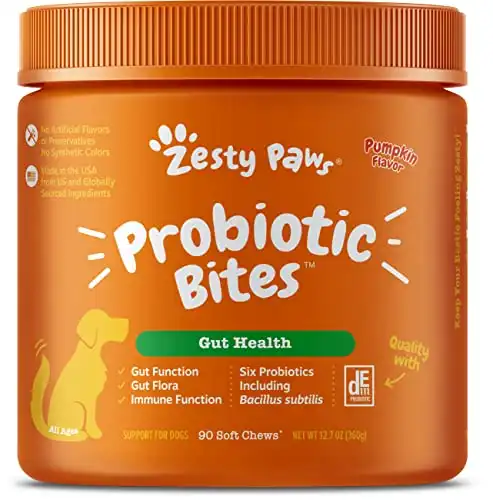
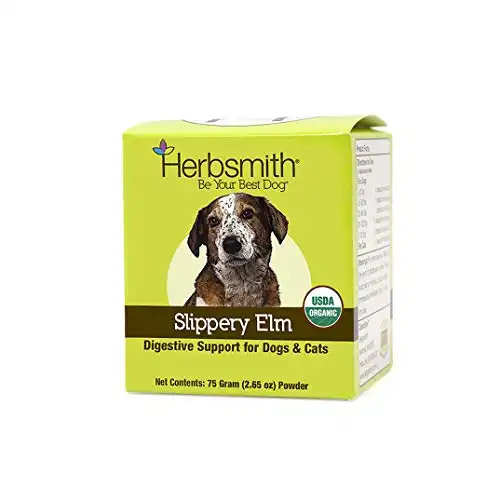
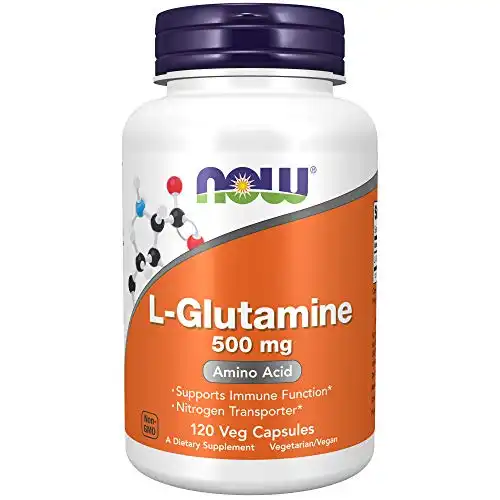
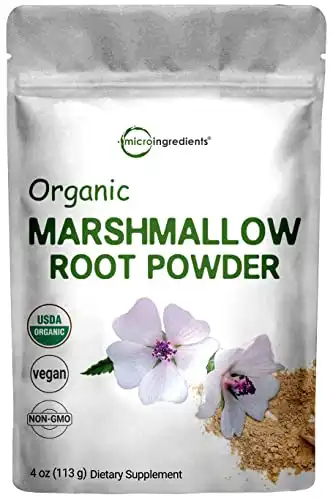
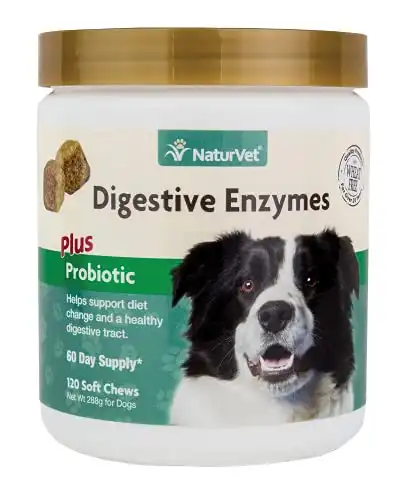
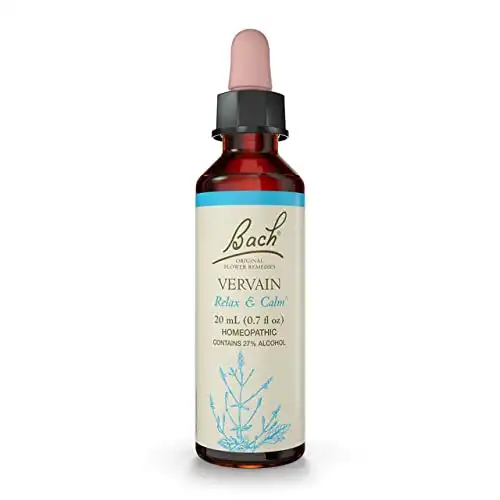
Leave a Reply